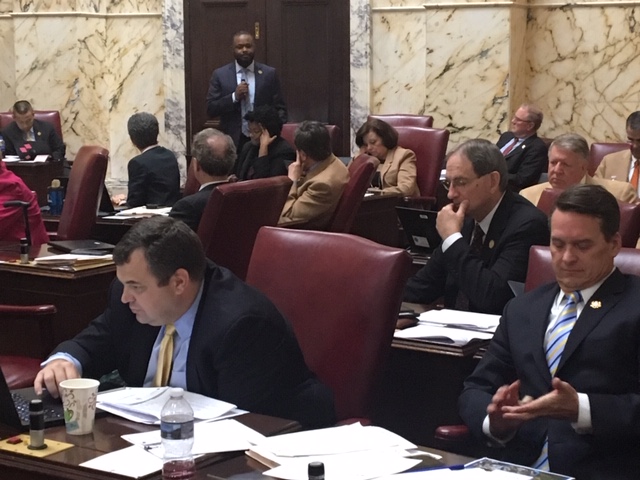Big Senate Debate Over a Small Allocation — For Private Schools

Senators moved forward on a $46.6 billion budget plan Wednesday – but not before prolonged debate about a private school scholarship program for low-income students.
The Senate version of the budget includes more than $1.3 billion in cash reserves, funds public schools at a record level of $6.97 billion, puts $445 million to school construction and allocates $225 million to implement the first round of recommendations from the Commission on Innovation and Excellence in Education, with an additional $95 million available if lawmakers pass a bill to assess taxes on online marketplace facilitators.
The Senate budget plan includes 103 amendments to a House bill passed last week and reflects a spending plan that is more conservative overall.
One of the Senate’s biggest points of difference with the House is on the BOOST scholarship program, a priority of the Hogan administration and a provision that was hotly debated in both chambers.
The House budget slashed the program, limiting future enrollment to students who already receive the scholarship or their siblings who wish to enroll in the same school. The Senate restored the cut funding – about $4.5 million – to fund the program at $10 million next year and maintained language that the scholarships can only go to children enrolling in schools that comply with nondiscrimination language.
But some lawmakers pushed back on the restored funding on the floor of the Senate.
“I would prefer to have public funding spent on our public schools,” said Sen. Cheryl C. Kagan (D-Montgomery), who may introduce an amendment addressing the program before a final vote on the budget Thursday.
Sen. Bill Ferguson (D-Baltimore City) said he understood concerns about the program, but noted that the $10 million appropriation was dedicated only to students eligible for free or reduced lunches, and that the entire allocation for the program represents .001 percent of state education funding.
Senators also noted that the House of Delegates has passed a bill – moving forward for the first time after several tries – that would codify anti-discrimination language for nonpublic schools into state law.
In this year and in the past, lawmakers have inserted year-to-year language in the state budget which required nonpublic schools that receive public funding to follow nondiscrimination rules in its admission process or risk losing state funds.
Earlier this month, the House passed House Bill 295 from Del. Jheanelle Wilkins (D-Montgomery), which would expand discrimination prohibitions that apply to nonpublic schools that receive public funding and allow claims of discrimination to be brought to the state’s Commission on Civil Rights. The bill was previously championed in the House by now-Sen. Cory V. McCray (D-Baltimore City), who introduced the Senate crossfile this year and is working to get the legislation passed in that chamber this session.
McCray said there are several nonpublic schools in his district that are “doing great work,” and his legislation is not meant to unfairly target anyone. “While that school might not be discriminating and is doing great work, I’ve got to protect all students in the state of Maryland,” McCray said. “While I believe that they’re helping folks, we still have to be mindful that this exists.”
Six schools have had $163,600 in state funding clawed back after state officials found they violated nondiscrimination policies.
The Maryland State Education Association has supported the curtailment of the BOOST scholarship program and the nondiscrimination bills from Wilkins and McCray.
“At a time when Maryland public schools are underfunded by billions of dollars every year, we cannot afford to shift taxpayer money to unaccountable private schools,” MSEA spokesman Steven Hershkowitz said Wednesday evening. “Educators support the House’s compassionate approach to phasing out the BOOST private school voucher program and will urge the budget conference committee to adopt that position. We will also continue to advocate for legislation to prohibit any private school that receives public money (through BOOST or any other program) from discriminating against students and staff.”
Ferguson noted Wednesday that the floor debate would not be the last discussion on the BOOST funding issue this session. With major differences between the House and Senate budget plans, a conference committee will be established as soon as this week to hash out a compromise spending plan.
“I suspect that this will be a topic in the conference committee,” he said Wednesday.




 Creative Commons Attribution
Creative Commons Attribution